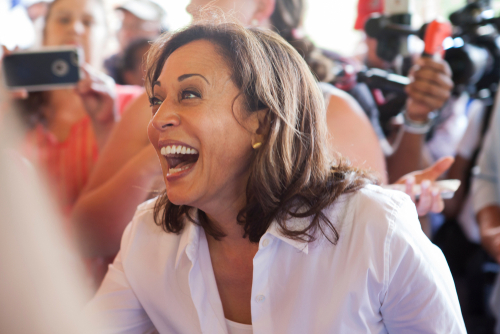
As the political landscape continues to evolve, Vice President Kamala Harris is reportedly laying the groundwork for a presidential run in 2028. Despite facing a challenging national approval rating, Harris has found a stronghold of support within South Carolina, a state that plays a pivotal role in the Democratic primary process.
Harris’s strategy appears to be one of deep community engagement, particularly within the African American demographic, which forms a significant portion of the Democratic base in South Carolina. Her frequent visits to the state since taking office have not gone unnoticed, with prominent South Carolina Democrats already voicing their support for her potential candidacy.
An alarming reminder that a vote for Joe Biden is a vote for Kamala Harris to serve as President. https://t.co/x6BAzB46cx
— Tom Cotton (@TomCottonAR) February 6, 2024
Representative James E. Clyburn, a heavyweight in South Carolina politics, has openly endorsed Harris, signaling a strong local backing that could prove crucial in a future bid for the presidency. This support is further bolstered by the sentiments of Trav Robertson, a former chairman of the South Carolina Democratic Party, who highlighted an “unspoken language” between Harris and African American women in the state, suggesting a deep-rooted connection based on shared experiences.
However, Harris’s popularity in South Carolina stands in stark contrast to her national approval ratings. According to a Five Thirty Eight Project poll as of January 19, a majority of Americans disapprove of the Vice President, with only 37.5 percent approving of her performance. This discrepancy poses a significant challenge for Harris, who must work to bridge the gap between her regional appeal and broader national sentiment.
Nikki Haley says "we WILL have a female president" in 2024.
"It will either be me, or it will be Kamala Harris." pic.twitter.com/dTlXorsu9S
— Julia 🇺🇸 (@Jules31415) February 2, 2024
Despite these challenges, Harris is not without her strengths. Polling conducted by Emily’s List, a Democratic fundraising organization, found that she enjoys high favorability ratings among key segments of the Democratic coalition, including Black women, younger voters, and college graduates. These demographics could form the cornerstone of her support base should she decide to run.
Yet, there remains a considerable portion of Democratic and independent voters who are unfamiliar with Harris’s personal story, her background as California’s attorney general and junior senator, or her accomplishments as vice president. This lack of awareness presents both a hurdle and an opportunity for Harris to define her narrative and accomplishments more clearly to the electorate.
In the meantime, Harris continues to play a supportive role in President Biden’s reelection campaign, while simultaneously nurturing her own political ambitions. Her actions suggest a careful balancing act between loyalty to the current administration and the cultivation of her own political future.
As the political tides ebb and flow, it will be interesting to observe how Vice President Kamala Harris navigates the complex waters of public opinion. With her eyes set on 2028, Harris’s journey is a testament to the enduring nature of American political ambition and the ever-present quest for higher office.










